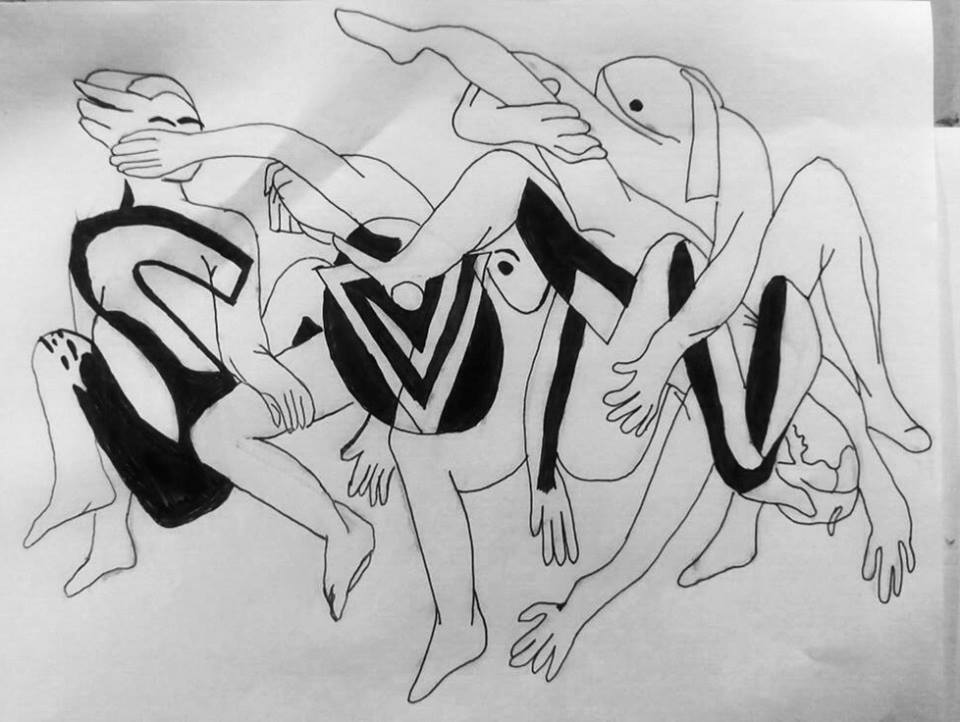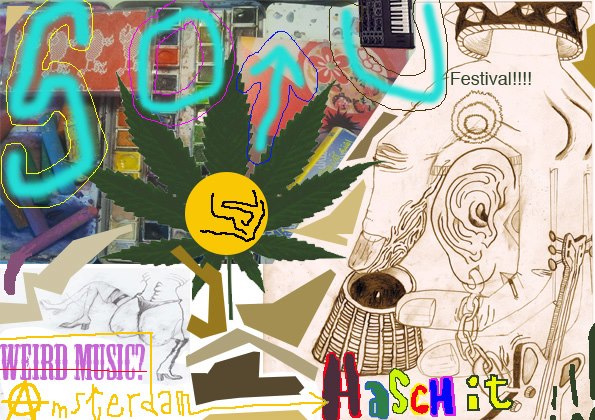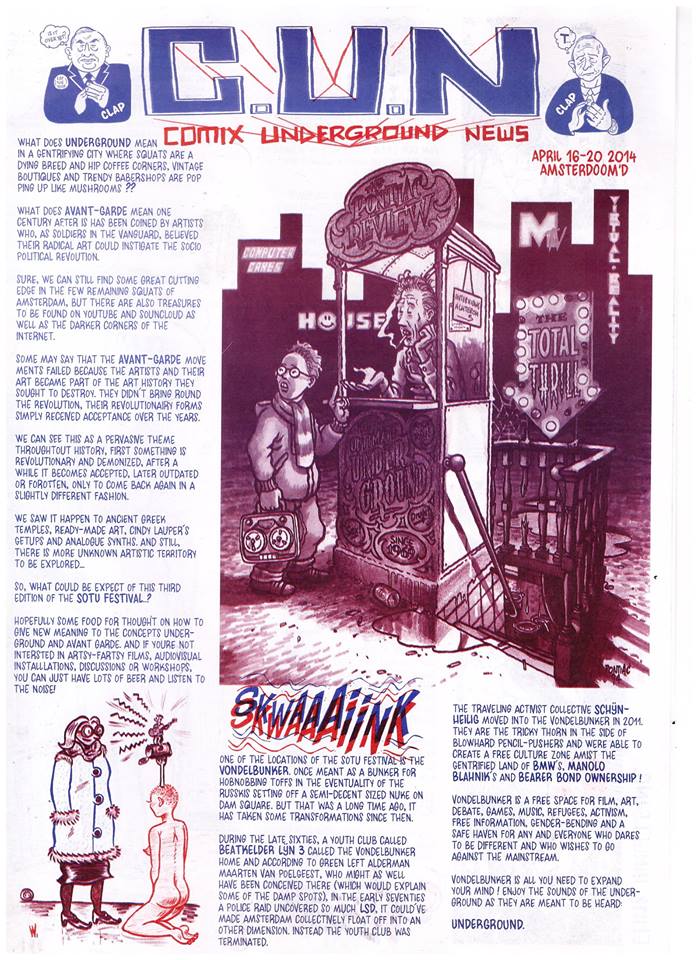
Drawing: Reinilde Jonkhout
"Mainstream comes to you, but you have to go to the underground."
- Frank Zappa
"Do
Whatever You Want, Don't Do Whatever You Don't Want!!" "As a result of
this philosophy we have lost money and the trust of society as a whole,
but we've gained time and freedom."
- Acid Mother Temple
"People got this idea that ultimately what
mattered was the quality of what you were doing and how much importance you
gave to it, regardless of how widespread it became or how many records it
sold."
- Lee Ranaldo

Postcard: Jonas Olsson

Comix Underground Newspaper, SOTU Festival 2014.
Big drawing: Peter Pontiac.
A short essay as to what the festival is all about:
Visual Overload
A couple
of years ago everybody was going on about web 2.0 and how the internet
was bringing real democracy to the public sphere. Now most of us have
realized that we are not so much being heard for our opinions, but just
providing data for mighty corporations that are selling our opinions
back to us in flashy formats. Where does the underground fit inside all
of this? Sure, the DIY-scene got a great boost out of it, but the
internet hasn't proven to be the right place for critical reflection,
let alone autonomous action. Getting below the radar has been virtually
short-circuited in The Internet age, while doing something for yourself
is also one of the things that drives capitalist thinking.
So what
really is this thing we call the underground nowadays? Unprofitable
cultural programs? The fetishist niches of the music market? Culture
funds for bikram yoga and indie film screenings? What is left of an
underground music scene when most of the output has become encompassed
in marketing algorithms by global networking? Where we used to stumble
upon exciting music in record stores, we now allow Spotify or Soundcloud
to recommend us what to hear and what not to hear. What is left of the
anti-establishment when even the protest itself has become
bureaucratized? Please fill out this form if you want to oppose the
increase in social housing rents, please fill out that form if you want
the prime minister to go fuck himself.
What is
left of it, I think, is a handful of places where people can come
together in actual time and space and do stuff that is not driven by
global capitalism or stained by welfare state bureaucracy. These places
should be supported not just because they provide us with a cutting-edge
program and are very modestly priced, but because these relatively
autonomous places are becoming increasingly rare.
It's not
just our healthcare and our education that's being succumbed to
neo-liberal rationality. If we stop thinking about alternatives to the
establishment, our bodies will become more and more like bureaucratic
systems and our minds will likely start to behave like
google-algorithms. So let's have some of that butchers
-tears-wonder-potion before we start praising tribal gods to shamanic
tones in The Occii.
'Turn off your computer, music is the weapon of the future' (Vengence Tenfold)
What we
are experiencing now in media and technology, Marshall 'The medium is
the message' McLuhan knew already half a century ago; technology doesn't
provide neutral tools, but actually shapes our behaviour. He saw in the
dawn of modern man, also an extinction of a tribal man. With the
introduction of the alphabet, language became visible instead of just
being audible. The tribal man was submerged in sound whereas modern man
is increasingly being led by the visual. The eyes are only our keenest
sense because we are expected to act upon so many visual impulses. Until
the Middle Ages, when the majority of the people were still illiterate,
the most important medium was sound and song instead of script.
Language as sung or spoken by the bard or preacher in songform provided
the people with a Medieval Google or newspaper.
It seems
that today we are neglecting out oral capacities more than ever, while
overconsuming on the visual. Television was to our parents like the
internet is to us, bt they would have been lucky to watch an hour or two
of material a week. While today, one years worth of material gets
uploaded every hour on to Youtube. It's not even that the visual space
has become more interesting - I can't help but look at the bored
expressions on those faces awkwardly lit from below those iPhones - it's
just become more onmipresent. Maybe there is a way to fight the
establishment by making use of this largely neglected audible world.
Another radical thinker that realized the potential of the audible was
John Cage when he asked why no-one ever really listens, despite
constantly hearing sounds. I still find it remarkable that his music to
this day sounds otherworldly and avant-gardist; while the visual
avant-gardist forms have already established themselves in the art
historical canon, much of the music-concrete still sounds like noise. In
other words: while this visual space is overloaded, there still is a
world of subversive sound to explore, an underground of music to mine
out so to speak.
Music,
the whole of audible or acoustic space, is not rational; it's chaotic,
intangible and floating in free space, while our establishment, the
government and neo-liberalism are rational, rigid, orderl. Everything
has its fixed place in visual culture. Music has all of the subversive
qualities we need for revolutionairy action; turn off your computer,
music is the weapon of the future.
Hugo de Gier, 2012

Collage: Pytr Baum, Cut & Paste Academy, Ruigoord











